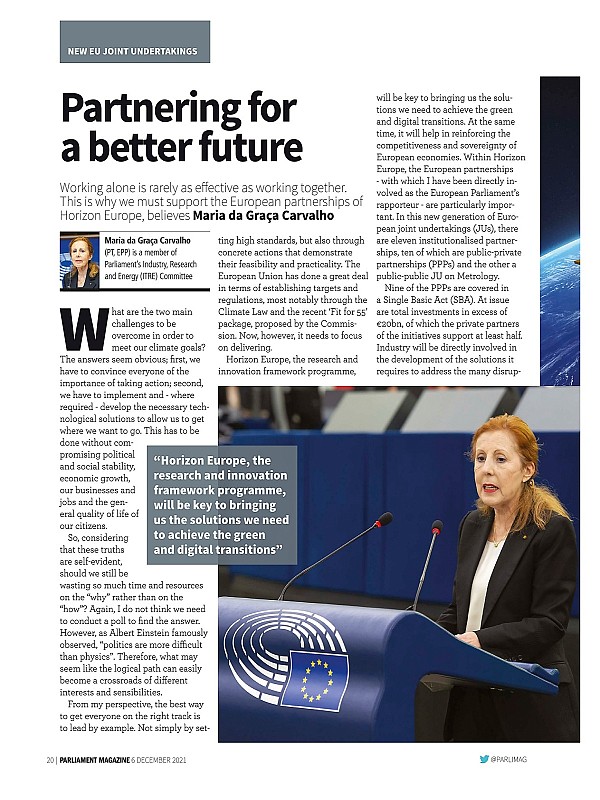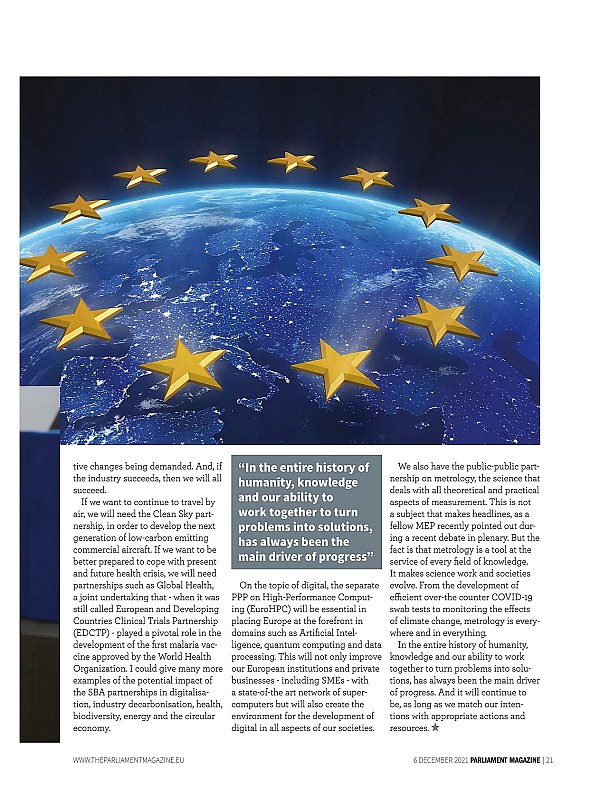Imprensa Partnering for a better future
What are the two main challenges to be overcome in order to meet our climate goals? The answers seem obvious; first, we have to convince everyone of the importance of taking action; second, we have to implement and - where required - develop the necessary technological solutions to allow us to get where we want to go.
This has to be done without compromising political and social stability, economic growth, our businesses and jobs and the general quality of life of our citizens.
So, considering that these truths are self-evident, should we still be wasting so much time and resources on the “why” rather than on the “how”? Again, I do not think we need to conduct a poll to find the answer.
However, as Albert Einstein famously observed, “politics are more difficult than physics”. Therefore, what may seem like the logical path can easily become a crossroads of different interests and sensibilities.
From my perspective, the best way to get everyone on the right track is to lead by example. Not simply by setting high standards, but also through concrete actions that demonstrate their feasibility and practicality.
The European Union has done a great deal in terms of establishing targets and regulations, most notably through the Climate Law and the recent ‘Fit for 55’ package, proposed by the Commission. Now, however, it needs to focus on delivering.
Horizon Europe, the research and innovation framework programme, will be key to bringing us the solutions we need to achieve the green and digital transitions. At the same time, it will help in reinforcing the competitiveness and sovereignty of European economies.
Within Horizon Europe, the European partnerships - with which I have been directly involved as the European Parliament’s rapporteur - are particularly important. In this new generation of European joint undertakings (JUs), there are eleven institutionalised partnerships, ten of which are public-private partnerships (PPPs) and the other a public-public JU on Metrology.
Nine of the PPPs are covered in a Single Basic Act (SBA). At issue are total investments in excess of €20bn, of which the private partners of the initiatives support at least half.
Industry will be directly involved in the development of the solutions it requires to address the many disruptive changes being demanded. And, if the industry succeeds, then we will all succeed.
If we want to continue to travel by air, we will need the Clean Sky partnership, in order to develop the next generation of low-carbon emitting commercial aircraft.
If we want to be better prepared to cope with present and future health crisis, we will need partnerships such as Global Health, a joint undertaking that - when it was still called European and Developing Countries Clinical Trials Partnership (EDCTP) - played a pivotal role in the development of the first malaria vaccine approved by the World Health Organization. I could give many more examples of the potential impact of the SBA partnerships in digitalisation, industry decarbonisation, health, biodiversity, energy and the circular economy.
On the topic of digital, the separate PPP on High-Performance Computing (EuroHPC) will be essential in placing Europe at the forefront in domains such as Artificial Intelligence, quantum computing and data processing.
This will not only improve our European institutions and private businesses - including SMEs - with a state-of-the art network of supercomputers but will also create the environment for the development of digital in all aspects of our societies.
We also have the public-public partnership on metrology, the science that deals with all theoretical and practical aspects of measurement. This is not a subject that makes headlines, as a fellow MEP recently pointed out during a recent debate in plenary.
But the fact is that metrology is a tool at the service of every field of knowledge. It makes science work and societies evolve. From the development of efficient over-the counter COVID-19 swab tests to monitoring the effects of climate change, metrology is everywhere and in everything.
In the entire history of humanity, knowledge and our ability to work together to turn problems into solutions, has always been the main driver of progress. And it will continue to be, as long as we match our intentions with appropriate actions and resources.


